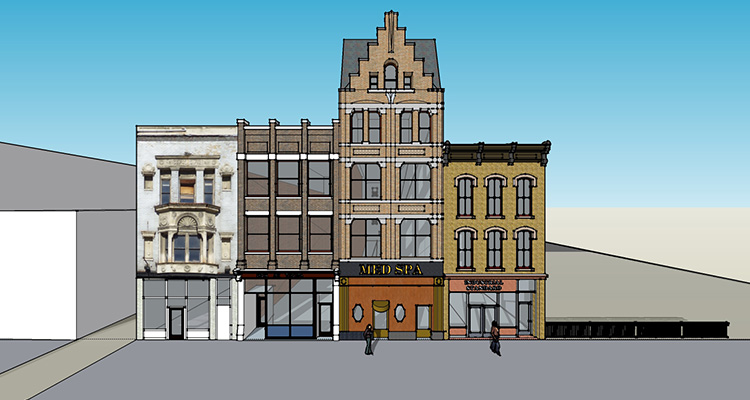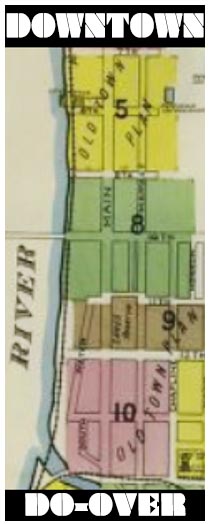 Editor’s note: Many of the Downtown Do-Overs featured in this occasional Weelunk series have been major projects — from WesBanco Arena to The Capitol Theatre to more than 100 apartments proposed for the vacant Wheeling-Pitt steel building. But, much of the downtown is dotted with smaller structures, some of which are vacant and on their last gasps of functionality. Today’s post looks at a block of these latter properties and an Arizona couple with a small-city dream.
Editor’s note: Many of the Downtown Do-Overs featured in this occasional Weelunk series have been major projects — from WesBanco Arena to The Capitol Theatre to more than 100 apartments proposed for the vacant Wheeling-Pitt steel building. But, much of the downtown is dotted with smaller structures, some of which are vacant and on their last gasps of functionality. Today’s post looks at a block of these latter properties and an Arizona couple with a small-city dream.
But, in the eyes of an Arizona couple seeking a downtown, over-the-shop life for their young family, the 1400 block of Market Street is a surprisingly perfect blend of home and business potential.
Ryan and Nikki Stoker are so set on moving their businesses and home to Wheeling, in fact, they are scheduled to present their redevelopment proposal to the city’s Development Committee on Tuesday.
The hearing, which will determine whether the project advances to full city council consideration, comes after the Stokers developed a five-phase/five-year plan with input from city restoration heavyweights including Wheeling Heritage.
That organization, which owns Weelunk, is charged by the National Park Service to interpret the city’s historic significance in a living, working community. And as part of that mission, they provide technical assistance to owners of historic buildings.
WHAT’S IN THE STOKER PLAN?
Stoker’s plan for street-level businesses includes a med-spa that would be operated by Nikki Stoker (a physician’s assistant who specializes in anti-aging and aesthetic procedures) and a showroom/workshop for Ryan Stoker’s industrial-vibe furniture.
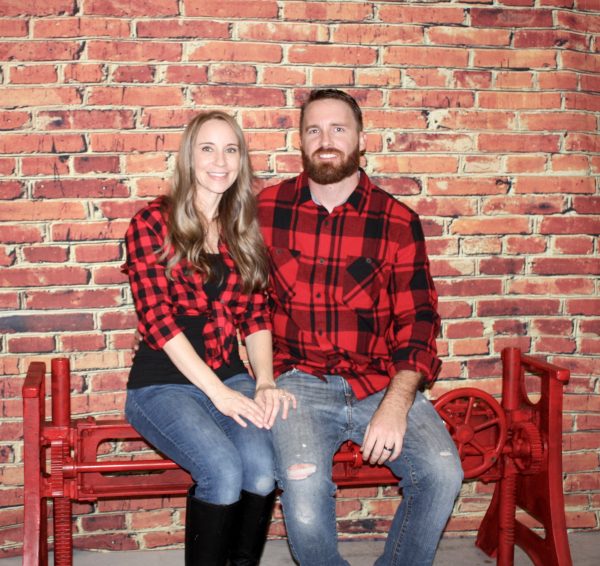
Also in the plan are a restaurant and a 24-hour fitness studio that could feature cross training or cycling.
Upstairs in each of the four buildings — whose addresses stretch from 1425 to 1437 — their plan calls for a handful of upstairs apartments that would include a home for their family of four. The family currently resides in Tucson, Arizona.
Their dream of living above their own businesses was one of the lures to Wheeling for the Stokers, according to Ryan Stoker.
Priced out of a similar plan in Tucson, they did a nationwide search, zeroing in on downtowns that could offer interesting historic properties, at least two storefronts, good schools, access to major cities for furniture sales/delivery and a population density high enough to support Nikki Stoker’s work.
“Wheeling was just right in that sweet spot,” Ryan Stoker said of being within their cost range in addition to meeting their wish list.
Noting his furniture mostly ships to California and Las Vegas now, he is delighted at the possibility of being close to Pittsburgh, urban centers in Ohio and New York City.
“Going from big city to big city on the West Coast is a lot of mileage,” Ryan Stoker said. “On the East Coast, it’s not so much.”
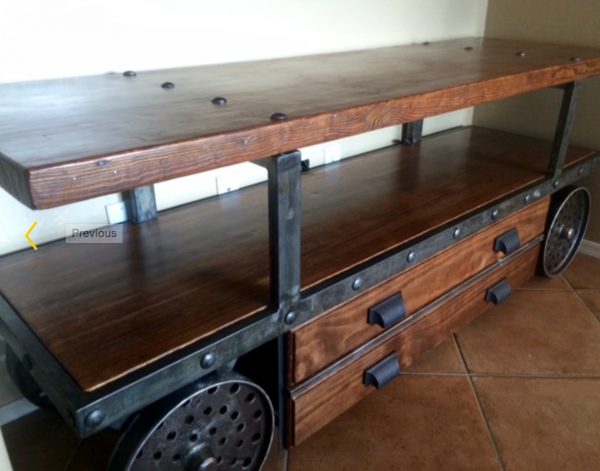
STACKING THE INCENTIVES
At the financial heart of the proposal, the Stokers are asking to buy the four buildings in question — which are bookended by the former Sportsmans Club on the north and an existing adult bookstore on the south — from the city for a symbolic $1 each.
But those buildings will come with a much larger price tag. From roof replacements to structural repairs, the Stokers are taking on a big project. Luckily, both West Virginia and Wheeling have recently adopted incentives that make these types of projects possible, explained Betsy Sweeny, who oversees historic building redevelopment at Wheeling Heritage.
West Virginia’s recent increase in the state historic tax credit is a big selling point for the state’s many long-vacant structures. Stack on potential incentives like New Market Tax Credits, development grants from the State Historic Preservation Office, the City of Wheeling’s façade improvement grant and technical assistance from Wheeling Heritage — and projects like these actually have a fighting chance.
“There are very few places in the country where you can do this kind of incentive stacking,” Sweeny said. “When all the available resources are utilized, buildings like the 1400 block go from blighted to profitable.”
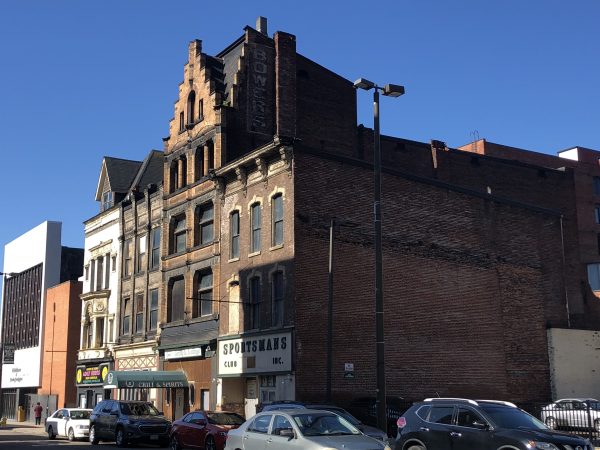
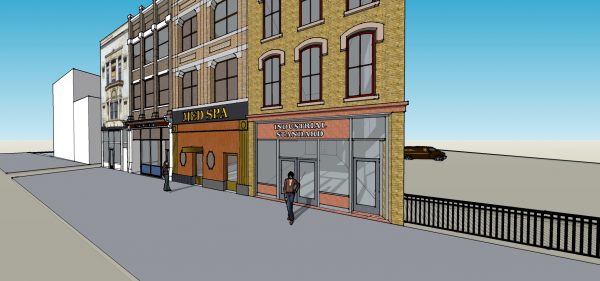
The Stokers come to the table with two years of redevelopment cash in hand and a plan for how to package together the rest.
“At a minimum, we are planning on spending $100,000 per floor and have the means to complete phase one and two of this project,” explained Ryan Stoker.
Those initial two phases would focus on two of the buildings and would include ground-floor space for the Stokers’ med-spa and industrial-furniture businesses, and five upstairs apartments. It also includes façade improvements on all four buildings on the block.
“Future phases will be addressed as soon as we are able to,” Ryan Stoker said. “So long as the rentals rent and the businesses are sustainable, we should have no problem tackling one phase (of the remaining three) per year until completion.”
Ryan Stoker believes his work background — which includes construction, remodeling and real estate — would be a big help. He believes his experience would allow many of the doors, floors and other architectural details of the buildings to remain salvageable.
“We’re not a big developer,” Ryan Stoker said of trying to work closely with the potential incentives for this project. But, he noted, they are willing to relocate their businesses, sink in a half a million to get started, and sweat through much of the work themselves.
WHY IT MATTERS
Sweeny noted the buildings (at least two of which have leaking roofs) and the block (which sees frequent police activity) aren’t exactly an asset to the city in their current state.
But, it’s got all the bells and whistles in other ways, she added. One of them is location.
“The 1400 block is critical in expanding the positive pedestrian corridor that is anchored by Independence Hall and West Virginia Northern Community College,” Sweeny said. “Establishing four small businesses and adding several residences above will increase activity and prosperity on Market Street.”
She also sees value in the proposal in terms of history.
“The 1400 block has one of the most unique assortments of architectural styles in a contiguous block in Wheeling,” Sweeny said.
“Overall, the eclectic influence is impressive, and then, individually, each building exhibits really distinct and interesting influences from Italianate to neoclassical to Flemish revival,” she continued. “This particular combination retains such impressive architectural integrity, it’s easy to see how it could draw national attention.”
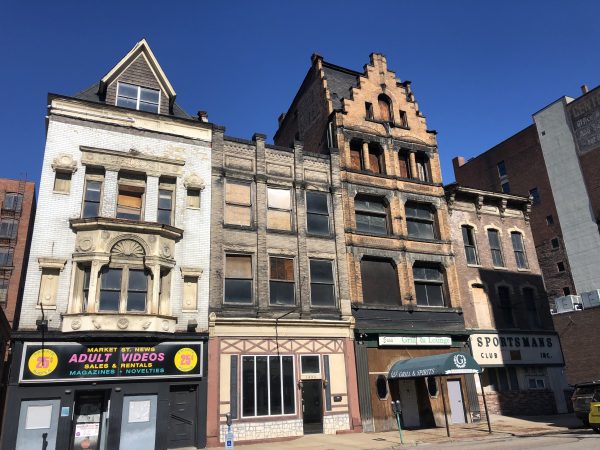
Boury Lofts and other key downtown redevelopments were financed with a similar mix of private funds, tax credits and city incentives, she noted.
In fact, it was Boury Lofts that linked the Stokers with Wheeling Heritage. During several visits to the city early this year, Ryan Stoker was impressed with that redevelopment. A visit to Boury led to a recommendation he meet with Sweeny, and the current proposal was soon taking shape.
“I happen to live in the Boury building, and I know the building manager. When he heard about Ryan’s idea, he immediately sent him over to Wheeling Heritage’s offices. Ryan popped in, shared a little about his desire to redevelop those buildings, and by the end of our meeting he was planning his next trip to Wheeling with his family.
“They’re small developers who want to live here,” Sweeny said of the project’s financing. “He’s not coming to Wheeling with $5 million in his pocket, but given a close look at their financial plan, I believe it will work.”
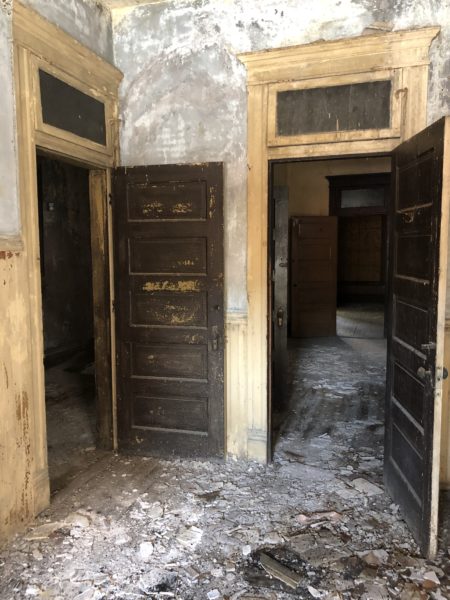
She said it’s also workable in terms of the buildings’ conditions.
“I was skeptical approaching the 1400 block, but after spending hours carefully examining the structure, I was pleasantly surprised. The buildings are not without challenges, but they are intact enough to be rehabilitated.”
In a statement that combines both that potential and the incentives the Stokers are seeking, she believes their proposal is also realistic on that count.
“The market in Wheeling simply doesn’t support this kind of redevelopment without incentives,” Sweeny said. “And, the personal buy-in of the Stoker family also can’t be overstated. These are people that are coming to Wheeling with the desire, not to be developers, but to be our neighbors.”


